We are beginning to see a relationship between the increase of cannabis use and the decrease of opioid addiction. Cannabis might have the potential to solve the problem of narcotic abuse at the root, if modern medicine will allow it. Read this article to learn more about the role cannabis has to play in the treatment of opiate withdrawal.
The use of cannabis to treat opiate withdrawal is a hot topic of conversation right now, with NBC, Reuters and even FOX covering the topic. This is especially so since we have seen a decrease in opioid deaths since the legalization of cannabis in the USA. This is not to suggest that cannabis is the complete cure for addiction, but we are beginning to see how it plays a role.
Essentially, scientists are discovering the potential of cannabis in treating the symptoms of withdrawal. The experience of withdrawal is probably one of the the hardest reasons for people to stop using drugs, since the easiest solution to withdrawal symptoms seems to just use again.
Perhaps cannabis is some kind of backdoor method to treat that problem. In any case, cannabis could be a great alternative to prescription medicines. We hope it is not too long before we can begin to see cannabis use as natural, and prescription medication as a last resort.
A little bit about the brain and opiates
It is important to understand something about opiate addiction in order to understand how cannabis plays a role in treating it. Opiates fall into a category of addiction that pertains to narcotics in particular. Narcotics affect the brain by altering the impulses that are related to reward, mood and the determination of consequences.
Someone who is suffering from addiction becomes dependent on the narcotic to function as a result of all of the neurological changes. These changes create the sensation that it is impossible to do anything without the assistance of the drug. What is particularly interesting is that the body responds to these neurological changes. It is not as though drug addiction is purely an emotional response; there is a physical element at play.

As a result of this physical element, those who decide to step away from their opiate addiction begin to experience withdrawal. This is the body’s response to the notion that it can’t go on without the narcotic! And it is very real. The symptoms of opioid withdrawal can include sweating, muscle aches, vomiting and nausea, irritability, and abdominal pain. Of course, there are also the emotional consequences of withdrawal such as anxiety and depression. As you can imagine, these symptoms are quite a force to contend with and many resort to reacquiring their addictions.
How can cannabis help with opiate withdrawal?
Cannabis comes in to play a role, not necessarily with treating the addiction itself, but with treating the symptoms of withdrawal. When we look at the bigger picture, treating the symptoms gives an addict the potential to spend more time away from their opioid addiction. This space away from their opioid addiction is an environment conducive to stay away from opioid addiction for the long term.
Cannabis is well known to be a muscle relaxant, therefore relieving some physical pain that patients might be going through. Furthermore, cannabis is a popular medicine for treating nausea, as it is antiemetic. This is often why cannabis is prescribed to those who are undergoing chemotherapy. It is also common for medical cannabis patients to treat their anxiety or depression with cannabis. In fact, it seems that cannabis has the potential to target many of the symptoms that come with opioid withdrawal.
Overall, cannabis is a far more supportive method of recovery than medicines such as methadone for example. Methadone is another opioid, and it does not come without its own risks and side effects, such as another potential addiction. It is just as addictive as heroin itself, and most opioid addicts are addicted to prescription opioids anyway. Although methadone can help addicts avoid relapse, it fundamentally triggers the same opioid receptors in the brain as heroin. This means that the root of the addiction never really gets treated.
Science seems to be re-affirming that cannabis is a helpful, non-addictive substance for treating those with opioid addiction. In the long term, it could be much more sustainable and effective to use medical cannabis as a treatment for the withdrawal symptoms associated with opioid use.

What science has observed about cannabis’ relationship to opioids
Modern scientific research is beginning to observe the relationship between cannabis use and opioid use. In a study conducted specifically about chronic pain in the Journal of Pain, it was found that patients suffering from chronic pain dramatically lowered their opioid use when they started using cannabis. Patients also reported that their cannabis use was associated with much less side effects than other prescription medications used.
In an article published by the Rolling Stone, psychiatric nurse and practitioner Anita Willard Briscoe said that so many of her patients benefited from cannabis use. In fact, Briscoe said that in the year between 2015 and 2016, about 25% of her patients were able to kick their opioid habits using cannabis. With cannabis, they were able to deal with their physical symptoms, they were better able to manage their anxiety and irritability, and they reported that that cannabis helps them to keep off opioids.
Cannabis is being coined as a potential solution to the opioid epidemic that is taking over the USA. In places where opioid overdose and addiction is a problem, cannabis is presenting itself as an extremely effective treatment.
Further studies
There seems to be a greater connection between cannabis and the world of opiates than just a medical treatment. Some studies have observed a connection between the legalization of cannabis and a decrease in opioid deaths. It might even be that sheer availability to cannabis encourages many people to go down the road of pot rather than Oxycontin! Opioid addiction has become such a problem in the USA that drug overdoses are the main cause of death in America.
In a study published in the JAMA Internal Medicine, researches noted that opioid related deaths decreased by about 33% in the 13 states where cannabis had been legalized. This information was collected in the six years immediately following the legalization of cannabis. We are considering something dramatic when we see the number of deaths drop by one third. If there is a real correlation here, the implications are extreme.
The number one reason that prescription medication is prescribed around the world is for the treatment of chronic pain. Prescription drugs might help temporarily, but when the person tries to lower their dose or even tries to quit them, that’s when the withdrawal symptoms start. From what we know, cannabis can help in 2 ways: First of all, cannabis can help with treating the withdrawal symptoms. But apart from that, cannabis can also help by treating the pain altogether, since it’s is an effective treatment for pain. This could avoid the problem of opioid addiction altogether.
What does all of this mean? It’s extremely hard to tell what the connection in these studies suggests. In any case, and from whichever angle we look at it, cannabis seems to be having a really positive effect for opioid addicts. Perhaps, the more cannabis enters modern medicine, the further away we will come from opioid addiction at all.
However, for the time being, cannabis has proven itself to be extremely effective at treating the symptoms of withdrawal. For addicts, this could mean a smoother ride to the finish line when trying to quit the habit.











Where to buy a medical marijuana?
Hi Smarp, Sensi Seeds offers a wide selection of high-quality cannabis seeds suitable for medicinal use. Just click here. All the best, Olivier